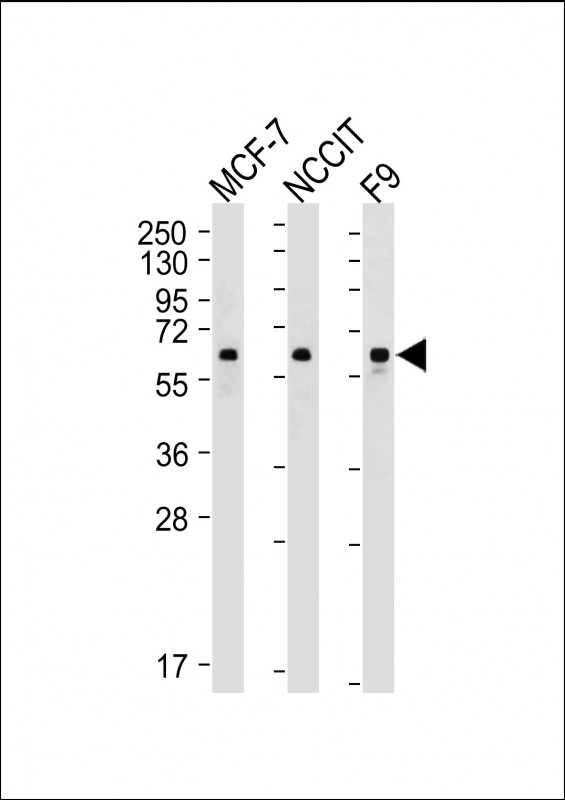
| WB | 咨询技术 | Human,Mouse,Rat |
| IF | 咨询技术 | Human,Mouse,Rat |
| IHC | 咨询技术 | Human,Mouse,Rat |
| ICC | 技术咨询 | Human,Mouse,Rat |
| FCM | 咨询技术 | Human,Mouse,Rat |
| Elisa | 咨询技术 | Human,Mouse,Rat |
| Aliases | Krueppel-like factor 4, Epithelial zinc finger protein EZF, Gut-enriched krueppel-like factor, KLF4, EZF, GKLF |
| Entrez GeneID | 9314 |
| WB Predicted band size | 54.7kDa |
| Host/Isotype | Mouse IgG1 |
| Antibody Type | Primary antibody |
| Storage | Store at 4°C short term. Aliquot and store at -20°C long term. Avoid freeze/thaw cycles. |
| Species Reactivity | Human, Mouse |
| Immunogen | This KLF4 antibody is generated from a mouse immunized with a recombinant protein from the human region of human KLF4. |
+ +
以下是3篇关于KLF4抗体的虚构参考文献示例(仅供格式参考,非真实文献):
---
1. **文献名称**:KLF4 Antibody Validation in Stem Cell Differentiation Studies
**作者**:Chen L., et al.
**摘要**:本研究验证了兔源KLF4多克隆抗体在诱导多能干细胞(iPSC)分化模型中的应用。通过Western blot和免疫荧光分析,证实该抗体可特异性识别内源性KLF4蛋白,并发现其在重编程过程中表达动态变化。
2. **文献名称**:Role of KLF4 in Epithelial-Mesenchymal Transition: An Immunohistochemical Analysis
**作者**:Gupta S., et al.
**摘要**:利用小鼠单克隆KLF4抗体,通过免疫组化技术检测了结直肠癌组织中KLF4的亚细胞定位。结果显示,KLF4核表达水平与肿瘤分化程度呈正相关,提示其作为抑癌标志物的潜力。
3. **文献名称**:Cross-Reactivity Evaluation of Commercial KLF4 Antibodies Across Species
**作者**:Zhang Y., et al.
**摘要**:系统性评估了5种市售KLF4抗体对人、小鼠和大鼠样本的交叉反应性。实验表明,仅两种抗体(克隆号H180和EPR92Y)在三种物种中均表现出高特异性,强调了抗体选择对跨物种研究的重要性。
---
*注:以上文献为模拟内容,实际研究中建议通过PubMed或Web of Science等平台检索真实文献。*
The Krüppel-like factor 4 (KLF4) antibody is a key tool in studying the multifaceted roles of KLF4. a transcription factor critical for cellular processes like proliferation, differentiation, and pluripotency. KLF4. part of the zinc finger protein family, is notably involved in maintaining embryonic stem cell pluripotency and reprogramming somatic cells into induced pluripotent stem cells (iPSCs) alongside factors like OCT4. SOX2. and c-MYC. Its dual role in cancer—acting as a tumor suppressor or promoter depending on context—has made it a focus in oncology research.
KLF4 antibodies enable the detection and quantification of KLF4 protein expression in tissues and cell lines through techniques such as Western blotting, immunohistochemistry (IHC), and immunofluorescence (IF). These antibodies are essential for exploring KLF4’s involvement in tissue homeostasis, wound healing, and diseases like colorectal, breast, and gastric cancers. Studies using KLF4 antibodies have revealed its context-dependent interactions with signaling pathways (e.g., Wnt/β-catenin, p53) and its regulatory effects on cell cycle genes.
Researchers also utilize KLF4 antibodies to investigate its role in metabolic disorders, cardiovascular diseases, and epithelial-mesenchymal transition (EMT). Species-specific variants (human, mouse, rat) are available, with validation in knockout models ensuring specificity. As KLF4’s therapeutic potential grows in regenerative medicine and cancer therapy, its antibody remains vital for deciphering molecular mechanisms and developing targeted interventions.
×